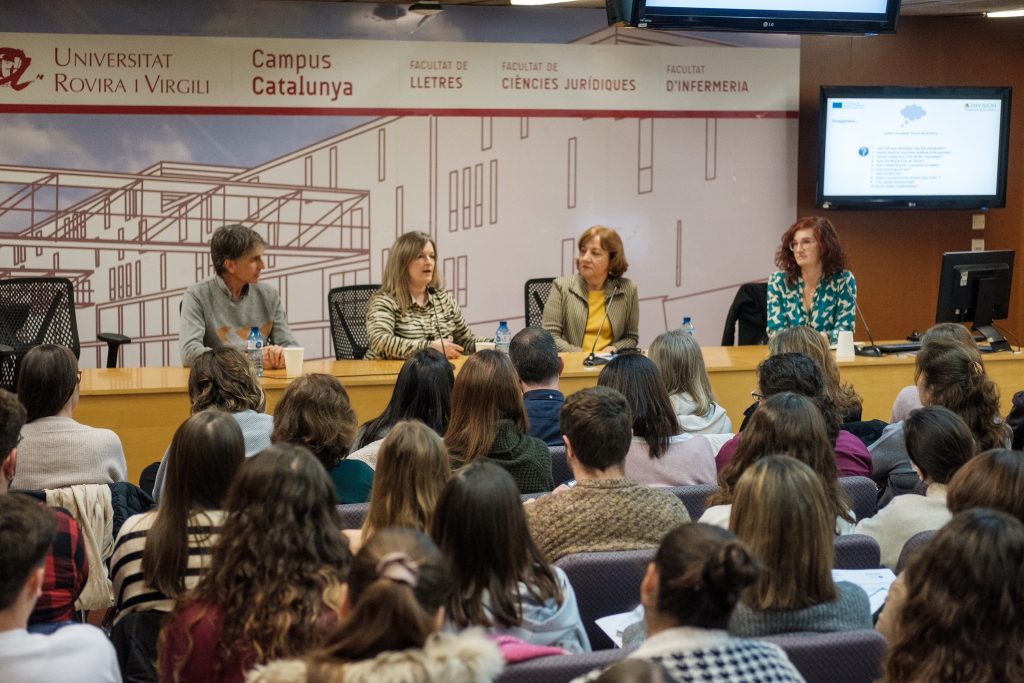Press notes 10/02/2023
The URV has developed a pioneering gamified virtual simulation as a teaching tool for the degree in Nursing
The tool was developed as part of the European Envision project and it was presented last Friday, when it was tested by students, and healthcare and education professionals. It will be available for use next academic year

The tool was developed as part of the European Envision project and it was presented last Friday, when it was tested by students, and healthcare and education professionals. It will be available for use next academic year
Faculties and departments of the Universitat Rovira i Virgili joined forces and expertise to develop a pioneering teaching tool. It is a gamified virtual simulation that will be used for teaching nursing courses and is part of the European project Envision (European Network of Virtual Simulation Online) of the Erasmus+ program. The simulation was tested for the first time last Friday in a meeting held at the Faculty of Nursing, in which it was used by both students, and health and education professionals, who then went on to exchange experiences and knowledge. The aim of the day was to discuss doubts and make suggestions so that any wrinkles can be ironed out.
In fact, it is the second simulation to be developed as part of this project. However, while the first one simulates home care, was tested a few months ago and is already available on the project’s website, this second virtual game focuses on a paediatric emergency. In both cases, a subjective camera is used to simulate a real event in which you have to answer questions for each situation. The simulation involves actors, costumes, makeup and staging to make it look real, and some professionals from the Emergency Services of Catalonia even played a role, so it is not too unlike a short film. Both simulations will be used in the classrooms of nursing universities around the world as from next academic year to supplement face-to-face simulation sessions.

With the collaboration of universities from Slovenia, Belgium, Finland and Canada, the URV’s Advanced Nursing research group and the Applied Research Group in Education and Technology were in charge of creating and developing the second simulation with the support of the Education Service. “One of the most enriching aspects of the project is the collaboration of faculties, departments and research groups, who have shared experiences, and optimized resources and expertise,” explained Dr Leticia Bazo, from the Advanced Nursing research group.
As well as the simulation, the project also includes teaching guides so that it can be used. “The aim is that all the institutions interested in using it will have the tools and instructions so that they can develop new simulation games, adapted to their needs,” said Dr Mireia Usart, of ARGET. The desire to teach and improve the project lies in the will for the project to have a long future, and in the exchange of ideas and thoughts.
More than a hundred people registered for the session: professionals from the hospitals Joan XXIII, Sant Joan de Reus and Vall d’Hebron: from the Pere Virgili Research Institute; nursing and education teachers and researchers from various universities, members of the Grisca Group (Nursing Simulation Research Group in Catalonia and Andorra), and students. The event was divided into the three usual stages of this type of teaching project: the prebriefing, in which the rules and the patient’s situation and background are explained; the briefing, that is to say, the virtual game itself on screen, and finally the debriefing, the part in which the experience, the procedures used and the points for improvement are shared, mediated by the teacher if the session is held in a classroom. “The activity is enriched by debate, reflection and practice,” said Dr Leticia Bazo. “The fact that the exercise has no penalties makes it a very powerful tool, since participants can try it several times, giving different answers to see the patient’s reactions… It is designed to work online, but also for classroom discussion“, added Dr Mireia Usart.
